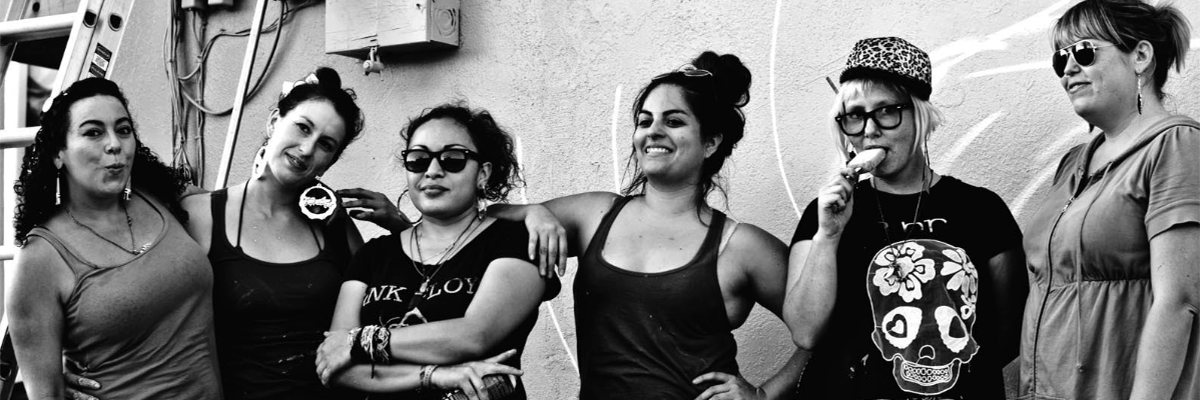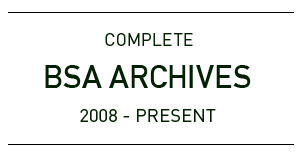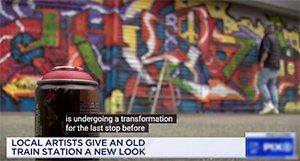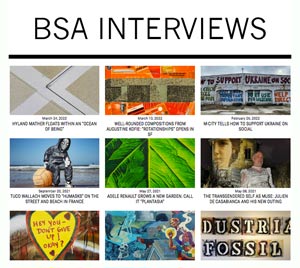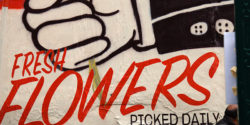An unusual opportunity to see this documentary this week for its first theatrical running. The thrill is compounded by the chance to see some “legends” on stage as well, says director Alexandra Henry – and she is right. Focusing on the street art and graffiti scene from a female perspective hasn’t been done previously. Still, the conversation about the balance of gender representation has been burning for more than a decade in the street and in festivals and street art symposia across the world. Henry travels across the US and into the Americas to find women to speak with to ask about their experiences in this practice that sometimes only happens in the shadows.
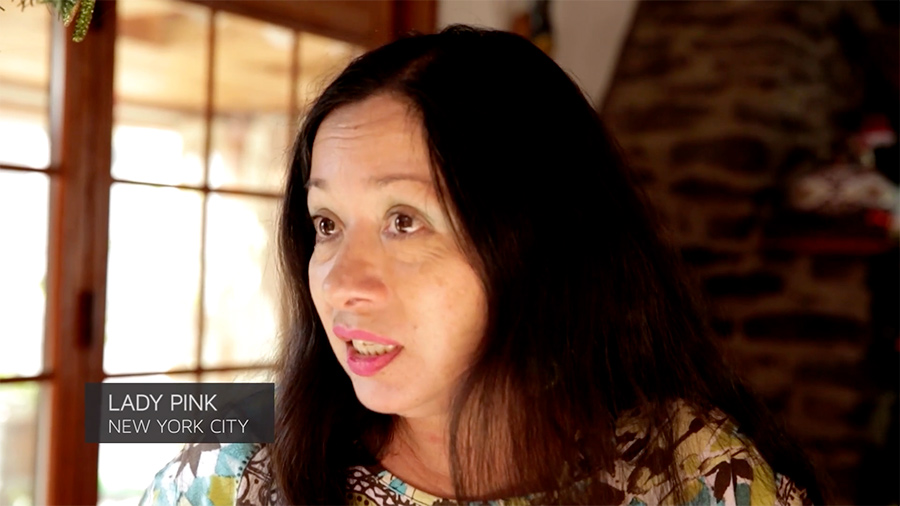
A fresh perspective that allows people to talk, Street Heroines unveils a complex history over time – inviting you to gain a greater appreciation for the players as well as the practices of a typical artist on the street today. When it comes to practicing these skills on the street as a woman in a macho or outright misogynist culture, the title appears as an accurate descriptor. Out from under the male gaze, these women have heroically been showing us the world from a vibrant, personal perspective that has required sacrifice, vision, and at times, some guts. Join Henry this week along with documentary photographer Martha Cooper and artists Lady Pink, Swoon, and Aiko right here in Brooklyn.
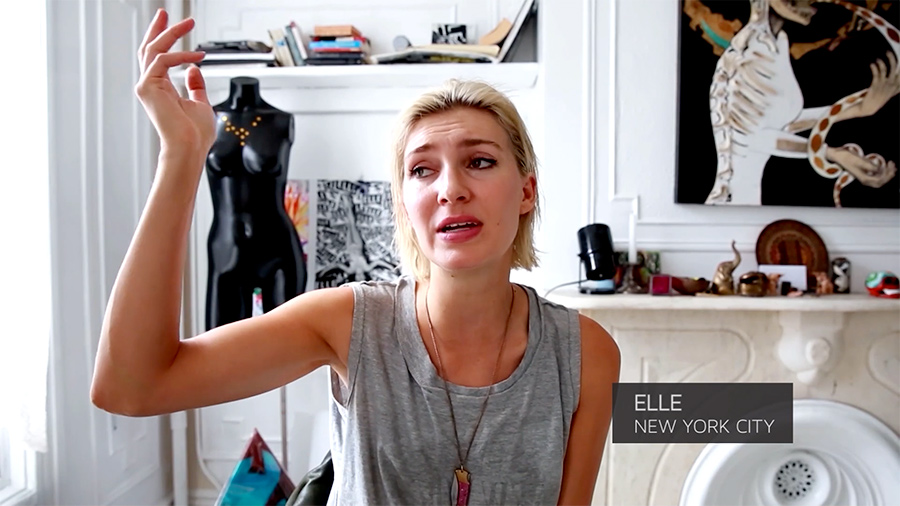
We had an opportunity to ask director Alexandra Henry about her film, her project, and the women she met along the way.
Brooklyn Street Art: Women artists have been typically under represented in receiving recognition for their work. This has been through and graffiti in Streetart as well. Do you see a change now?
Alexandra Henry: When I started this project 10 years ago it was because I recognized a deficiency in the representation of women in the movement. And I also recognized my own ignorance as I hadn’t realized there were so many female artists participating in graffiti and street art. I had been paying attention and documenting the subculture scene since I was teenager growing up in the Washington, D.C. area and then when I went to college in Los Angeles. But not until my late 20s, living in NYC, did I ever consider there were women out there doing graffiti or making street art.
In making this film, I wasn’t sure how it would begin or end, but I knew it would be important to honor the pioneering women who paved the way for the current generation of artists. Showing how Lady Pink’s and Martha Cooper’s friendship and collaboration put women on the map and inspired others to find their creative voice, not just in the USA but on a global level, is something we felt was an essential throughline in the particular stories we’ve chosen to tell in this film. It’s the ‘see it be it’ factor and we as filmmakers hope it is just the beginning of shining a light on the likes of talented women, who like TooFly says in the film, will get inspired to take their art to the next level. We want to make these women household names beyond the subculture and into the mainstream.
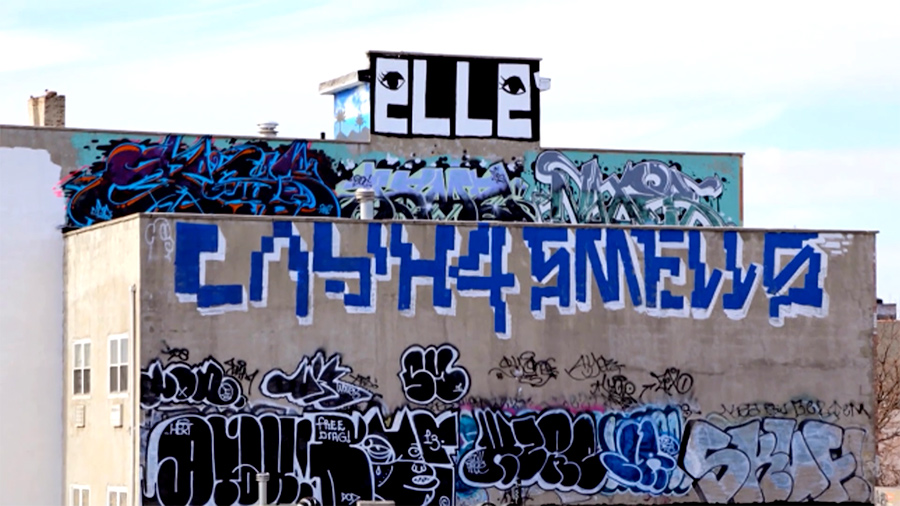
Brooklyn Street Art: From your original idea to fundraising to protecting and traveling and meeting the artists in your film, It has been a long journey. How did the final results differ from what you initially conceived?
Alexandra Henry: As I have a background in photography, initially I wanted to make a photo essay of women in the graffiti and street art movement. At the time, however, I was starting to experiment with video and learning how to edit so I decided to ask for their permission to film them while they were working and for an on-camera interview because I felt that capturing their process was just as important as highlighting the finished piece. I believe it is very impactful to hear directly from the artist, in their own voice. So I set out to make short films of each artist who agreed to be documented.
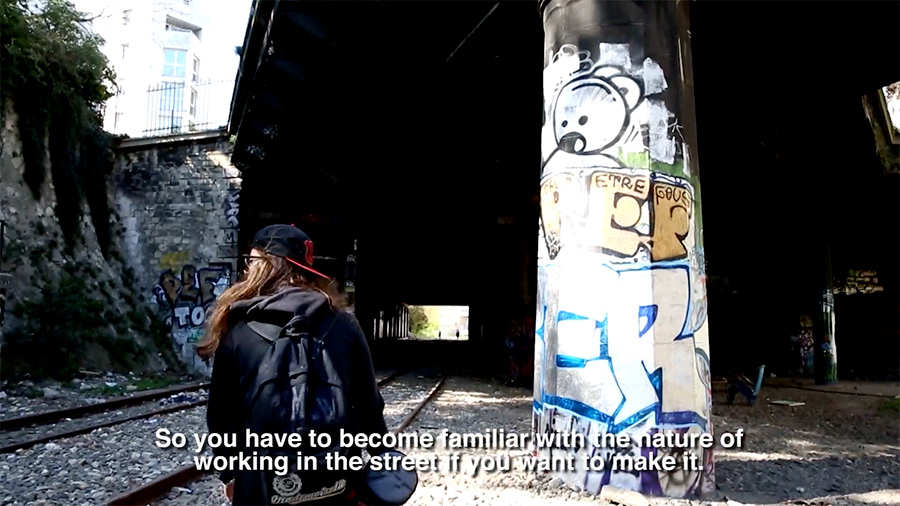
Eventually, I saw a bigger story coming together as women attributed their interest in the medium to others who came before them. I couldn’t find any of that history documented so I decided to make a feature-length film that would not only nod to the historical participation of women in the game but also look at the subculture through the female lens to show how much ground women have gained. As we know, the future of graffiti and street art is unpredictable, so contrary to my initial approach, where I had planned to tie up the story with a nice little bow, I’ve left it open-ended as I feel this could just be the beginning of telling many, many more stories.
Brooklyn Street Art: What is the best way to support a female artist?
Alexandra Henry: The best way to support a female artist is to start with the young ones who show interest in the creative arts! And give them encouragement and resources to further develop their interest, whether through books, trips to see local murals, street art festivals, art museums, studio visits, and gallery shows. Street Art is everywhere; it’s prolific, so even if you don’t live in an urban area like New York City or Mexico City, or São Paulo, you can still find examples of street art in small towns. Point it out to your young artists so they can see their surroundings from a different perspective. And to support our Street Heroines and any female artist trying to break through, most artists have studio practices and sell their work, and you can find them via their social media posts. I’d recommend following them, buying their work, and attending their events if you are able to. If you work for a brand or art institution and are reading this article, hire more female artists, designers, creative directors, curators, filmmakers, etc.!
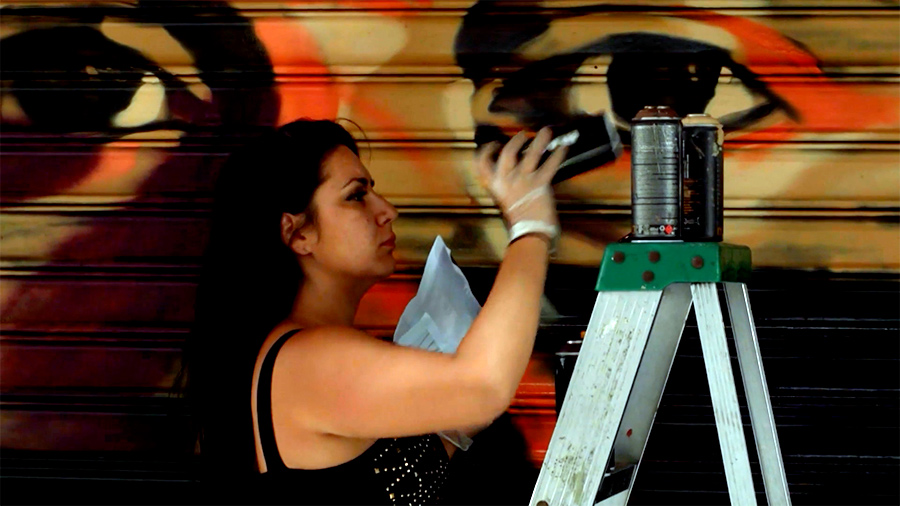
Brooklyn Street Art: What is one primary difference that you observed between men and women in working style or approach?
Alexandra Henry: When it comes down to the working style or approach, I’d say we should differentiate between graffiti and street art. Graffiti, which is an illegal act that usually happens very fast, has a more aggressive approach and is meant to provoke society or fulfill one’s ego. And regardless if you are a man or woman, those are the intentions behind it. Street Art, to be clear, is usually done with permission and the artist can take their time to finish their piece. I’d say the messaging in street art aims to be thought-provoking and ego-stroking as well. But listening to some of the artists in the film, they note, for example, that many images in street art that portray women are made by male artists and are used to sell something or to show their view of society. So when a female artist or artists paint themselves in their own image, they eliminate the male gaze, and therefore the approach is inherently different than that of their male counterparts.
Brooklyn Street Art: Have you been personally inspired by the process and the results of making this film?
Alexandra Henry: Making my first feature-length independent film has been a testing process on so many levels, but very inspiring at the same time. I didn’t anticipate it taking this long, and I also feared the subject matter might feel dated or irrelevant if the film ever did get released. However, living with all of these artists in the edit bay for the past 5 years and listening to their stories of resilience, over and over again, gave me the energy to keep moving forward. Their perseverance truly resonated with our filmmaking team and me. I have to mention it was difficult not to include every artist we shot, but I hope to make a doc series in the near future because there are so many powerful stories we have tee-ed up.
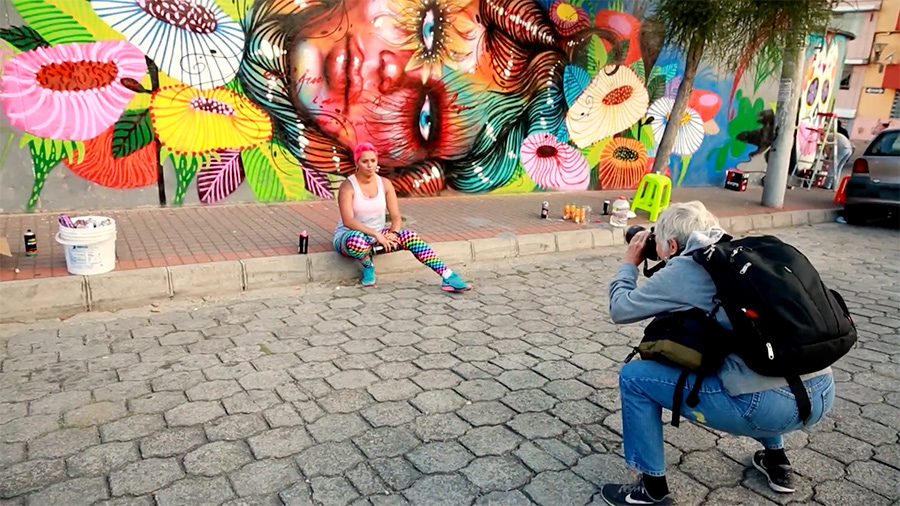
As for the timing of the release, I feel like there is no better moment than now for Street Heroines to reach a wider audience so they can get to know these women, hear their stories, experience their art, and witness the very political act of just being a woman creating in the public space having her own agency. Especially given where we are as a society in the USA right now, where women’s rights are getting the rollback. As far as results are concerned, this past year we had a great film festival run for such an independent documentary, which was very exciting. I always love it when I hear from audience members who say they never thought or considered that women were graffiti or street artists until they watched the film.
I also get many follow-up comments or emails with pictures of street art people notice in their day-to-day life! I think the film helps open people’s perspectives to the power of public art. Additionally, I would say all the women who have reached out over the years from around the world to express their appreciation for the work we are doing in documenting this angle of the street art and graffiti movement and also wanting to be part of it, is very telling of how flourishing the community of female artists is at a global level.
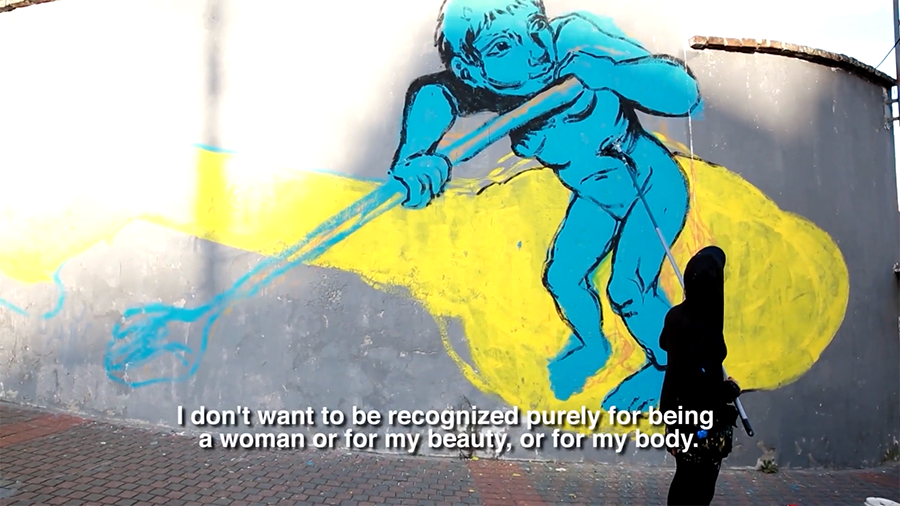
Screening at Nitehawk Williamsburg on Wednesday, September 14th @7:30PM
Full Info is Available HERE
Nitehawk Cinema, World Theatrical Premiere with Artist Panel, Williamsburg, Brooklyn, September 14th & 20th, 2022
Other Articles You May Like from BSA:
Welcome to BSA Images of the Week. People are so careful sometimes to let you know that certain artists are self-taught. You wouldn’t think it so necessary to make the distinction but it’s of...
When we invited Luna Park to the Brooklyn Museum to be onstage with us and Swoon (Callie Curry) a few years ago, she told us she was a bit nervous because of the size of the audience, but really she w...
All American Temper Tot is the name of the new installation by Street Artist Ron English on the Houston Bowery Wall in Manhattan, and the US flag-based design may be comforting to the average patrioti...
Welcome to BSA Images of the Week! Happy St. Patricks Day to all our Irish brethren and sisteren (?) — unless you are unlucky to be a gaylesbitrans Irish resident of Staten Island: their offi...
“Leave the rationality of your brain and listen to your heart, what you feel, what vibrates,” recommends ASU, the muralist painting the Contorno Urbano wall in Barcelona this month. ...
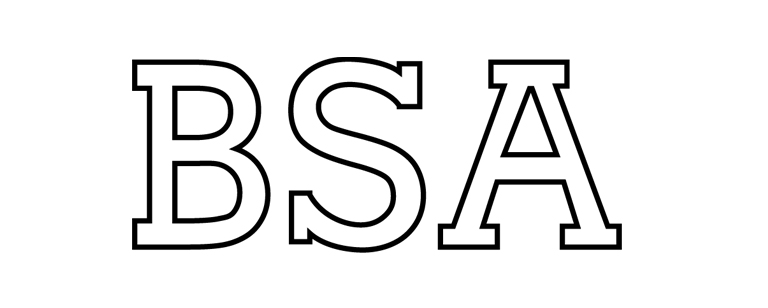 BROOKLYN STREET ART LOVES YOU MORE EVERY DAY
BROOKLYN STREET ART LOVES YOU MORE EVERY DAY